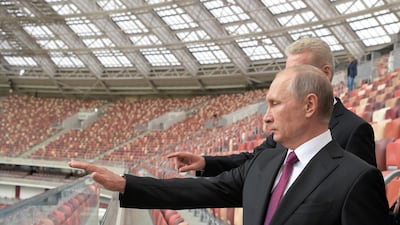The summer of 1980 was gearing up to be an impressive showcase for the Soviet Union as it prepared to host the Summer Olympics – until the country invaded Afghanistan. Russian dissident Andrei Sakharov called for a boycott and after the US endorsed the policy, several dozen countries pulled out. What should have been a celebration of sporting achievement became a clash of political ideologies.
Politics and sport rarely mix well but even more rarely can they be separated. Today as in 1980, Russia is once again on a collision course with western powers and a huge global sporting event has become politicised, both within and beyond the host country.
“We have opened our country and our hearts to the world,” said Russian President Vladimir Putin in a short video released last week as players began to arrive in Moscow. “Welcome to Russia.”
For Mr Putin – hardly a football fan but cognisant, as any politician must be, of the sport's wide appeal – the World Cup is an opportunity to showcase a particular vision of Russia to his own people and the world.
From the starting kick in two days' time to the final whistle next month, this World Cup will be suffused – infected, even – with politics.
For Russia, it is a political tournament at a time when the country is more dominant in global politics than it has been for decades.
For the West, particularly European leaders, it is a tense moment, with politicians wary of giving legitimacy to the Russian regime but fearful of looking out-of-touch with their football-obsessed electorate.
And for many of those competing, there are political landmines as the games throw up sporting clashes between countries engaged in political ones.
The beautiful game has a surprisingly ugly side.
As happened in 1980, politics reared its head long before kick-off with early calls for a boycott of Russia. The poisoning of a former Russian spy and his daughter in a sleepy British town in March – with the finger pointed at Russia by the British – began the calls.
Boris Johnson, Britain's foreign secretary, at first seemed to raise the prospect of the England team being kept at home before a storm of protest forced clarifications to be swiftly issued. The UK government has settled for not sending any high-level diplomats to the event.
Calls for a widespread boycott by athletes, rather than merely political representatives, never gained much traction but the World Cup certainly comes at a moment of incredible tension between Russia and the West. Moscow's involvement in the Syria conflict, its annexation of Crimea and the blame levelled at it for the downing of a civilian airliner have meant relations are as bad as they have been for decades.
______________
Read more from Faisal Al Yafai:
Turkey's growing influence in the Balkans has profound implications for the Middle East
Assad’s claim that he is willing to rewrite Syria’s constitution is merely a fig leaf
Tunisia's leading woman politician who found a second act after the revolution
______________
But many inside and outside Russia will be willing to look beyond the politics to the sport on the pitch. A World Cup that is professionally organised and completed without security incidents will be a triumph for Mr Putin, reflecting the image he likes to portray of his presidency. And a global audience watching the World Cup is less likely to be interested in Russia's poisons, annexations or naval bases in Syria.
The politics on the pitch is not confined to Russia and the West. Perhaps fortunately, the most potentially explosive matches will not happen. Perennial rivals Spain and Portugal will face each other but Sweden versus Denmark and South Korea versus Japan, two rivalries that always bring out the latent nationalism of those countries, will not take place.
This year, four Arab countries have made it to the tournament, plus Iran. It is unlikely, although possible, that Saudi Arabia could play Iran, a potentially combustible clash that would be seen as the sporting proxy of the pair's current geopolitical clash.
When Saudi Arabia and Egypt meet, it will reflect the good relations the two countries have. But if either play Iran, it will be seen through the prism of politics – with certain triumphalism to follow from the winning party.
None of these matches, of course, will change the geopolitical reality. Saudi Arabia will still face Iran's proxies in Yemen; Russian arms will still threaten Europe.
But somehow, far from making people forget the difficult political realities, footballing rivalry only seems to exacerbate it.
Perhaps the reason lies in the messiness of politics and the neatness of sport. No football clash, however bathed in meaning, will extend beyond extra time. Two hours after kick-off, it will all be over, with a clear result.
Politics, unfortunately, is not like that. Think back to the 1980 Olympic boycott. Then US president Jimmy Carter had successfully denied Moscow the global celebration it wanted.
Yet it turned out to be a pyrrhic victory. Public opinion turned against the decision and what ought to have been a moral victory was turned into political posturing. Within months, Mr Carter had lost an election to Ronald Reagan.
The neat lines of sport had morphed into the blurred lines of politics.
At a time when global politics seems more blurred than ever, the beautiful game should be a distraction from ugly geopolitics. Instead, because of the complexity of global affairs, the sport is at risk of becoming a substitute for it.


